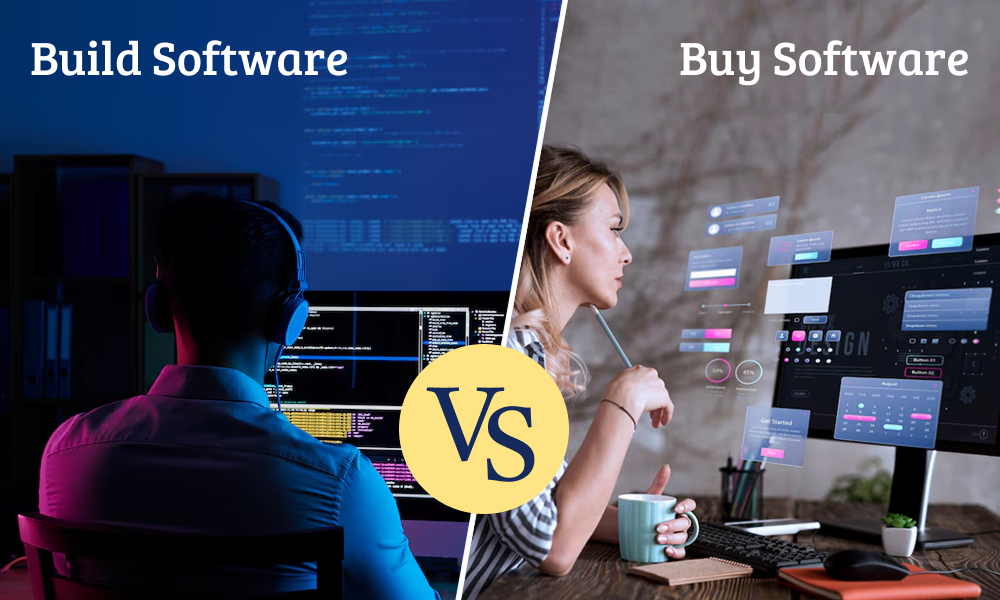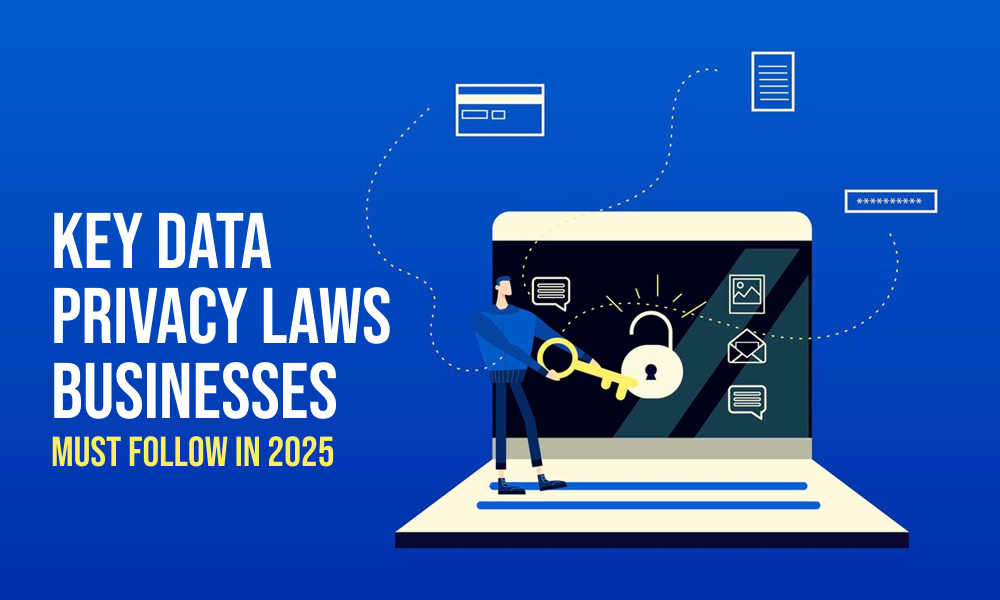table of content
- Introduction
- Buying a Software
- Benefits of Buying a Software
- Drawbacks of Buying a Software
- Building A Software
- Benefits of Building a Software
- Drawbacks of Building a Software
- Building Vs Buying: What’s the difference?
- Cost of Buying Software
- Cost of Building Software
- How to Choose for Your Business?
- Conclusion
- FAQs
Build Vs Buy Software

Introduction
Companies have to make the important decision of buying or building software. Their costs, flexibility, scalability, and competitive edge are all affected. While customized solutions promise bespoke functionality and future efficiency, pre-packaged software provides rapid deployment and low cost.
Which one suits your business best? Should you invest in off-the-shelf software that cuts time and effort, or invest in a custom solution that is perfect for your operations?
This blog goes in-depth into the advantages, disadvantages, price, and attributes of each strategy, which will help you decide based on your needs and growth plan. Find out which option will improve productivity, creativity, and return on investment for your business by continuing to read.
Buying a Software
Purchasing software is like selecting a pre-packaged meal, already prepared to be eaten, taking time and effort off your hands. Most businesses use pre-packaged software, which is designed by established suppliers and tested and proven. You select the program that suits your requirements, purchase it, and start using it immediately instead of building it from scratch.
Purchasing software ensures continuous security enhancements, innovation, and updates from top IT firms. Although it may not be customized to each need, it provides dependability, support, and a tested history, which makes it a safer option.
Benefits of Buying a Software
- Available: Pre-built software is ready to use with little or no configuration. The ready-made software can be employed quickly with no lengthy development cycles leading to software being used soon after it is installed with minimal cost and time to deploy. It is faster to provide your team with pre-built software than to have software developed from scratch.
- Cost Effective: Purchasing software is less expensive than developing software from scratch. You are not required to buy the development costs, you still receive reliable technology, and you can have ongoing maintenance at a fraction of the cost.
- Reliable and Tested: Vendors thoroughly test software, which is utilized by many businesses and has a track record of dependability. This lowers risks, lessens software bugs, and offers a reliable, secure solution supported by continuous vendor support and frequent updates.
- Rich in Features: Many features are available in off-the-shelf solutions that serve a variety of industries. The software is adaptable and appropriate for various operational requirements since businesses can access extensive functionalities without requiring extra development work.
- Vendor Support and Updates: Most ready-made software comes with customer support, helpful documentation, and troubleshooting assistance. Regular updates, security patches, new features, and enhanced performance are a big plus. Businesses can remain competitive without instant development.
- Quick and Easy Integration: Most off-the-shelf products integrate well with business applications such as CRMs, ERPs, and payment systems. Easy integration increases efficiency and simplifies processes, and companies can also use numerous technologies without instant custom development.
Drawbacks of Buying a Software
- Minimal Customizations: Pre-packaged software is developed for a larger audience which limits any customizability. Businesses may find it difficult to customize features to meet their specific workflows and potentially even change their procedures instead of having a resolution adapted to them to fit their needs.
- Integration Problems: Pre-packaged software does not easily integrate into existing business tools which can facilitate inefficiencies and complications. Teachers can become reliant on a third-party tool or work-around to meet certain needs, adding complexity and cost to their overall solution, to ensure flawless compatibility with the current systems used.
- Vendor Lock-In: Businesses rely on the vendor for maintenance, support, and updates. It can be expensive and complicated to switch, particularly if data migration is challenging due to specific formats or licensing restrictions.
- Unnecessary Features: This software includes a wide range of features that accommodate a diverse group of users, many of which will ultimately be irrelevant to a particular business. Consequently, businesses buy software with functions that are rarely used.
Building A Software
Building software is similar to creating a meal from scratch; you choose the ingredients, manage the procedure, and produce an item that meets your requirements. Custom-built solutions, as opposed to off-the-shelf software, are made especially for your business and guarantee smooth integration, special features, and complete scalability. Customized processes or competitive advantages cannot be facilitated by ready-made software.
Although development requires resources and time, the product is a solution that precisely matches your objectives. They can increase efficiency, automate procedures, and optimize routes by creating custom software. The long-term advantages of flexibility and customization outweigh the higher initial cost.
Benefits of Building a Software
- Suitable Requirements: Custom software is made for your business in particular. It’s all about ensuring it fits your specific needs like a glove. That means you have just the features you want, eliminating the unnecessary that causes hindrances, and increasing efficiency by addressing those particular issues that off-the-shelf solutions typically overlook.
- Increased Flexibility: A tailored solution can expand your company, so it’s simple to modify and scale with ease. While off-the-shelves software tends to restrict your capacity to change, custom software gives you the power to modify, enrich, and upgrade functions as your company changes.
- Increased Security & Compliance: With software developed specifically for your company, you define the safety standards and compliance rules for regulatory needs. They can implement advanced safety measures, protect sensitive information, and operate based on industry standards without jeopardizing security or violating compliance guidelines.
- Seamless Integration: Custom software easily integrates with existing tools, databases, and workflows. Instead of configuring off-the-shelf solutions that need more connections and fixes, the proper software integration will eliminate inefficiency and thus lead to better performance.
- Competitive Advantage: Custom software offers unique functionality to set your business apart. While off-the-shelf software has standard and minimum features, custom software will maximize productivity and streamline processes that will provide a tech advantage.
- Long-Term Cost Efficiency: While custom software has high upfront costs, it avoids regular subscription fees and expensive upgrades common with commercial offerings. In the long run, the savings on subscriptions and unused features make it an affordable investment for businesses.
- Ownership & Control: You maintain exclusive ownership of the software and have an obvious vendor lock-in and external support. This ownership allows you to revise, adapt, and expand the software according to your needs and schedule without dependence on third parties or limitations.
Drawbacks of Building a Software
- Large Upfront Costs: Creating customized software takes extensive upfront investments to hire specialists, purchase infrastructure, and invest in research. Unlike commercial off-the-shelf software with predetermined pricing, building customized software from the ground up requires significantly more money before being able to recoup the cost.
- Long Development Time: By the time customized software is developed, tested, and deployed, it takes months, if not years. Implementation delays may lead to slower operational delivery, which would not be ideal for organizations needing an immediate option to address urgent operational issues.
- Ongoing Maintenance and Updates: After custom software is deployed, there is a recurring need to support software, fix bugs, and update features. As an integral part of normal operations, business can allocate resource considerations for continuous development, software updates, and security fixes, which are likely to increase operational costs in the long term.
Building Vs Buying: What’s the difference?
When deciding between building custom software or purchasing off-the-shelf solutions, consider the following key differences:
- Customization and Fit: Custom software development allows you to create software that are tailored to your business processes and needs. Pre-packaged software products are a standardized solution with features that may not fully align with your business, and you may need to modify your processes to adjust the pre-packaged software.
- Cost of Development: Custom software development is often more expensive initially because of development costs, testing and maintenance costs and infrastructure costs, but the total investment can offer lower costs in the long run. Off-the-shelve solutions are usually less expensive initially, but licensing cost and customization and recurring cost can be more differential in the overall package on a yearly basis.
- Time to Deployment: The custom software development process – design, development and testing phases – is a substantial investment of time before you can deploy it. Off-the-shelve software, on the other hand, can be used more quickly, and offers immediate solutions to business challenges.
- Flexibility and Scalability: When compared to Off-the-shelve software products, scalable custom software is easier to make adjustments to as your business grows. Off-the-shelf software generally has some restrictions on its flexibility for further migration or expansion as needed, and after incurring initial and licensing costs, the migration costs can be high in effort or funds as well.
- Competitive Advantage: Custom software development can be a clear competitive advantage by providing your business capabilities that directly align with business strategies. Off-The-Shelve software is less differentiating for your business as it is used by many businesses in the industry.
Cost of Buying Software
Off-the-shelf software is priced from $1,000 to $100,000, a cheaper initial preference. However, there are additional costs of 22–25% of the buying price for yearly maintenance and extra charges for scaling, features, or users. Long-term costs are higher because of the hidden charges and licensing limitations. Though the timeline for ROI can differ, the level of customization is limited, therefore, it is not as flexible to adjust unique business requirements.
Cost of Building Software
Custom software development requires a significant initial outlay of funds, which range from $100,000 to $400,000. Moreover, annual maintenance accounts for 15–25% of the initial expenditure. However, long-term expenditures are cheaper, and scaling costs are predictable due to the absence of license fees. Despite a two to three-year return on investment, the software is fully customized to ensure optimal company fit and efficiency.
How to Choose for Your Business?
It can be challenging to decide between off-the-shelf and custom software. Your long-term objectives, financial constraints, and business requirements will all influence the best choice. Ask yourself these important questions and decide which option best suits your needs to make an informed decision.
1. What are your business’s specific needs and requirements?
- If your business can function well with existing software, buying may be the best option.
- If you need specific features and workflows, the building is better.
2. Are there ready-made solutions that fit your needs?
- If an off-the-shelf product meets 80% of your needs and requires minimal adjustments, buy it.
- If no software meets your requirements without significant compromises, build it.
3. Is there a competitive advantage in building custom software?
- If custom software gives you a unique edge over competitors, build it.
- If software isn’t central to your competitive advantage, buy it.
4. What is your budget?
- If you have a limited budget, buy off-the-shelf software.
- If you can invest in a long-term, scalable solution, build it.
5. What are the long-term costs?
- Buying has lower upfront costs but recurring fees (subscriptions, licensing).
- Building costs more initially but can reduce expenses in the long run.
6. What is your timeline for implementation?
- If you need software immediately, buy it.
- If you can wait and want a customized solution, build it.
7. Does your team have the expertise to build and maintain custom software?
- If you have an experienced development team, build it.
- If not, buy software with vendor support.
8. Do you need ongoing support and maintenance?
- If you prefer a vendor to handle updates and issues, buy it.
- If you want full control over maintenance, build it.
The choice between developing or purchasing analytics software purely depends on your team’s needs, your timeline, your budget, and your long-term vision. Off-the-shelf may do a faster setup and usually less upfront cost. Custom software has flexibility, scalability, and attributes to fit that distinctive situation.
It is vital to look at what is open in the market, how much it would take to customize, and how well the software will develop with you. Costs and risks should be analyzed to estimate short-term gains or long-term benefits. The final measure is choosing the right decision whereby analytics software will realize business growth, enhance efficiency, and empower decisions based on data.
Conclusion
Deciding between buying or building software is a choice that will rely upon your business objectives, budget and projected goals. Off-the-self software can be quickly fixed, so, if you are looking for flexible and scalable solutions that help you differentiate yourself from your competitors, custom software may suit your business needs better.
If you want a custom future-proof solution that helps your business operate smoothly and promotes business growth and efficiency, Codestore can assist you. As a custom software development company, we can develop software that fits your needs perfectly. Contact us today for software that can grow your business! Visit: Contact Us for Custom Web & App Development Services
FAQs
What is the difference between building and buying software?
Building software provides customized solutions tailored to business needs, while buying software offers pre-built, ready-to-use solutions with limited customization but quicker deployment and lower upfront costs.
Which is more cost-effective: building or buying software?
Buying software has lower upfront costs but ongoing licensing fees. Building software requires a higher initial investment but offers long-term savings by eliminating recurring subscription costs.
How long does it take to develop custom software?
Custom software development can take several months to a year, depending on complexity, features, and integrations, whereas off-the-shelf software is available for immediate use.
What are the risks of buying off-the-shelf software?
Off-the-shelf software may have limited customization, vendor lock-in, unnecessary features, and integration challenges with existing systems, making it less flexible for evolving business needs.
Is custom software more scalable than off-the-shelf software?
Yes, custom software is highly scalable, adapting to your business growth. Off-the-shelf software has fixed features and scalability limitations, which may require additional costs for upgrades.
What industries benefit most from custom software?
Industries with unique workflows, compliance needs, or complex operations like healthcare, finance, logistics, and SaaS benefit from custom software for enhanced efficiency and competitive advantage.
What factors should businesses consider when choosing between build vs. Buy?
Consider budget, customization needs, scalability, competitive advantage, integration ease, and long-term costs to decide whether building or buying software aligns better with business goals.
Why choose Codestore for custom software development?
Codestore offers scalable, high-quality, and cost-effective custom software solutions designed to meet your business needs. Contact us today to develop a future-ready software solution!



